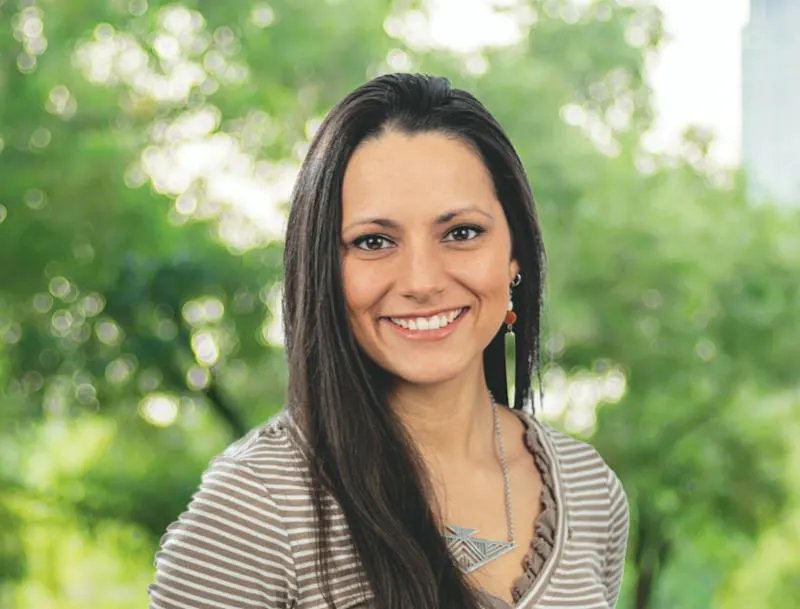Assistant professor of environmental justice education brings expertise in collaborative teaching and learning in Indigenous communities.
The UCLA Department of Information Studies has appointed Nicole Barry (McDaid) as an assistant professor of environmental justice education, effective July 1, 2023. Barry’s research focuses on STEAM teaching and learning, particularly within Indigenous contexts, with an emphasis on partnerships across schools, families, and communities. Recent publications include “Then the Nettle People won’t be lonely: Recognizing plant personhood in an Indigenous STEAM summer program,” for the journal, Cognition and Instruction; “Indigenous Water Pedagogies: Cultivating Relations Through the Reading of Water,” for the Occasional Paper Series; and a chapter co-authored with UCLA Associate Professor of Education Ananda Marin, “Enacting Relationships of Kinship and Care in Educational and Research Settings,” for the book, “Critical Youth Research in Education: Methodologies of Praxis and Care.” The book is co-edited by UCLA Professor of Education Teresa McCarty, and was published in 2020 by Routledge.
Professor Barry has been an invited presenter at several conferences on environmental justice issues in teaching and learning. At the 2022 Annual Meeting of the American Educational Research Association (AERA), she participated in a Presidential Session titled, “Community within: Activism and community-based research as a way of life,” and in a paper symposium with her work on, “Beginning with our original teachings: Launching activities with Indigenous Axio-Onto-Epistemologies to create conditions for thriving.” Professor Barry also gave a workshop, “Centering Human and More-Than-Human Interactions Across Wildly Different Educational Contexts,” for a conference of the North American Association of Environmental Education in 2021.
Barry’s co-authored papers, “Living stories in teaching and learning for remaking nature-culture relations,” and “The Power of Storytelling and Storylistening for Human Learning and Becoming,” were chosen for the 2020 International Conference of the Learning Sciences. Her co-authored article, “Creating science learning environments in which Indigenous students can thrive,“ is featured on the National Science Teaching Association Blog. Professor Barry also contributed the chapter, “Indigenous Family Engagement: Authentic partnerships for transformative learning,” to the book, “Research on Family School Partnerships: Ethnocultural Diversity and the Home-to-School Link,” published by Springer in 2019. Her new publications in press or preparation are the co-authored chapter, “The Future is Black and Indigenous!” for the book, “Futures of Indigenous Education,” to be published by The New Press; and a co-authored article, “Indigenous science education and STEM-related education,” which will appear in Oxford Bibliographies.
Professor Barry has been recognized for her work with a number of prestigious honors, including the Spencer/National Academy of Education Dissertation Fellowship, the Gates Millennium Scholarship/Fellowship, the Center for Native American and Indigenous Research Fellowship, and the Sibyl N. Heide Fellowship from Northwestern University.
Barry’s national and international leadership experience includes her service as a reviewer for the journal, Mind, Culture, and Activity; a graduate student representative for the AERA Indigenous Peoples of the Americas Special Interest Group; and organizer of the 2020 Learning Sciences Graduate Student Conference. She is currently a member of the Political and Ethical Perspectives on Learning Virtual Lab; an advisory board member for the M.S. in Education program at Northwestern University; and an advisory board member for the Center for Native American and Indigenous Research (CNAIR). Professor Barry is a member of AERA, the International Society of the Learning Sciences, and the American Psychological Association.
Most recently, Barry worked on Dr. Megan Bang’s collaborative research project, “Intergenerational Learning, Deliberation, and Decision Making for Changing Lands and Waters,” funded by an “Advancing Informal STEM Learning” grant from the National Science Foundation. Barry also recently served as an Indigenous STEAM Summer Program Teacher, supported by another NSF AISL grant to explore the impact of culture and experience on reasoning about complex socio-ecological phenomena among students from diverse backgrounds.
Barry’s teaching experience also includes assisting with courses from “Foundations of the Learning Sciences” to “Moral Development: Hip hop culture to the Amish way,” at Northwestern University. She has also taught high school English classes for Seattle Public Schools and the Marysville Charter Academy for the Arts in Marysville, California.
Professor Barry achieved her Ph.D. in learning sciences at Northwestern University. Her dissertation was titled, “Understanding and cultivating close nature-human relations: Indigenous Knowledge Systems and education toward sustainable and just environmental futures.” Barry earned her M.A. in teaching at Pacific University, and her bachelor’s degree in sociology at Northeastern University, with which she graduated summa cum laude.
